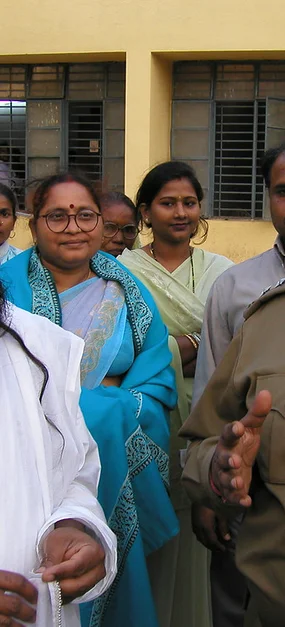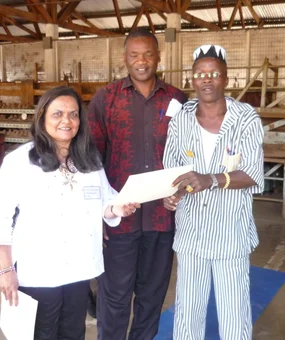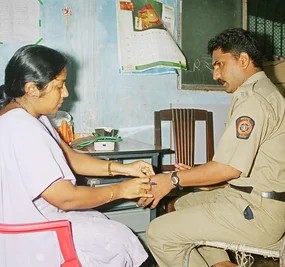A Glimpse into Compassionate Policing
In the realm of law enforcement, among the stern faces and strict adherence to regulations, there exists a beacon of compassion and transformation. Meet Deputy Superintendent of Police (DSP) P.N. Singh of Ranchi, who embodies this ethos, transcending the traditional boundaries of policing to foster compassion among both police officers and prisoners alike.
DSP P.N. Singh firmly believes, “Whatever crimes people commit, they do it because of the lack of love and because of stress. I keep this in mind while interrogating them. I ask them what they feel, and they always say that they didn’t know how it happened out of ignorance.”
Nobody is Bad
“Even if it is a convict, I have learned to believe that nobody is bad.” At the core of DSP Singh’s philosophy lies a profound axiom: “Nobody is bad.” This seemingly simple yet profoundly radical belief forms the cornerstone of his interactions with convicts and members of the community. To him, every individual, regardless of their past actions, possesses the inherent capacity for change and redemption.
DSP Singh’s journey towards this realization was not instantaneous. It was forged through years of experience, witnessing firsthand the complexities of human nature and the underlying factors that often lead individuals astray. Through empathy and understanding, he seeks to dismantle the barriers of judgment and condemnation, offering instead a hand of compassion and support to those in need.
The Art of Living Way
The transformative impact of the Art of Living’s Happiness Program resonates deeply with DSP Singh. Introduced to the program in 2008, he found within its teachings profound wisdom that transcended conventional notions of justice and punishment. Through practices such as meditation, breathing techniques, and self-reflection, he honed his interrogation skills and cultivated a deeper understanding of human behavior and psychology.
The Art of Living program served as a catalyst for DSP Singh’s own journey of self-discovery and personal growth. It instilled within him a newfound sense of purpose and direction, empowering him to become not only a better policeman but also a source of hope and inspiration for those around him.
“After I did the program, I regretted that I did not do it earlier because I could have done much better service had I done it when I joined the police force,” he says.
Today, DSP Singh is an Art of Living teacher himself.
He is now all set to organize a program for the Armed Police Force wing of the Jharkhand Police. Singh says his spiritual practices bring an effortless balance between his work and service. “I always start my day with Sudarshan Kriya. These days there is a lot of pressure in society, human values are deteriorating, families are breaking, and people come to us these days with small complaints that take up most of our time. So we make them understand that if they sit together and do some service, then we will be able to build a good society.”
Transformation in Bokaro
The impact of DSP Singh’s endeavors extends far beyond the confines of his jurisdiction. In the prison walls of Bokaro, he spearheaded initiatives aimed at rehabilitation and societal reintegration. By introducing the Art of Living program to inmates, including former Naxalites, he provided them with a pathway toward personal transformation and societal contribution.
Singh first incorporated the program there, resulting in the surrender of 60-70 hardcore Naxalites, over 50 of whom have done the Art of Living program. Across both the prisons of Bokaro, over 3000 convicts have undertaken the Art of Living program.
The transformation in Bokaro began after Gurudev Sri Sri Ravi Shankar’s visit to the region, known for its Naxal presence, in July 2010. “The Naxalites have training centers here. It was after Gurudev’s visit that The Art of Living programs began for the Naxalites, many of whom have surrendered arms and now lead a happy life.”
He has also helped organize the Youth Leadership Training Program (YLTP) and rural Waves of Happiness Programs in the region. “We also conducted health camps in Bokaro twice a year, benefiting thousands of people. Apart from organizing tree plantation drives; we have also planted over 5000 saplings,” he shares.
Many convicts and Naxalites visited the local Art of Living Center to take up advanced programs and skill development programs. “We have many examples of Naxalites who now lead a transformed life, with their families, something that would have been impossible for them earlier. Some former convicts also return to their hometowns and organize programs to bring about transformation, through programs like the YLTP.”
President’s Police Medal
Mr. Singh has been nominated for the President’s Police Medal, which he attributes to the Art of Living program and how it shaped him as a better policeman.
A devoted policeman, Mr. Singh retired on August 31, 2014. In his tenure of service to the nation, over 500 police personnel underwent the Art of Living Happiness Program as a part of his initiative.
In the life and work of DSP P.N. Singh, we find a powerful example of the enduring power of compassion and empathy in the pursuit of justice. His view of people be they criminals or their families is unique, as he puts it “Earlier I felt that I must prevail over them, now I feel I must work with them to end violence in the society.”





















